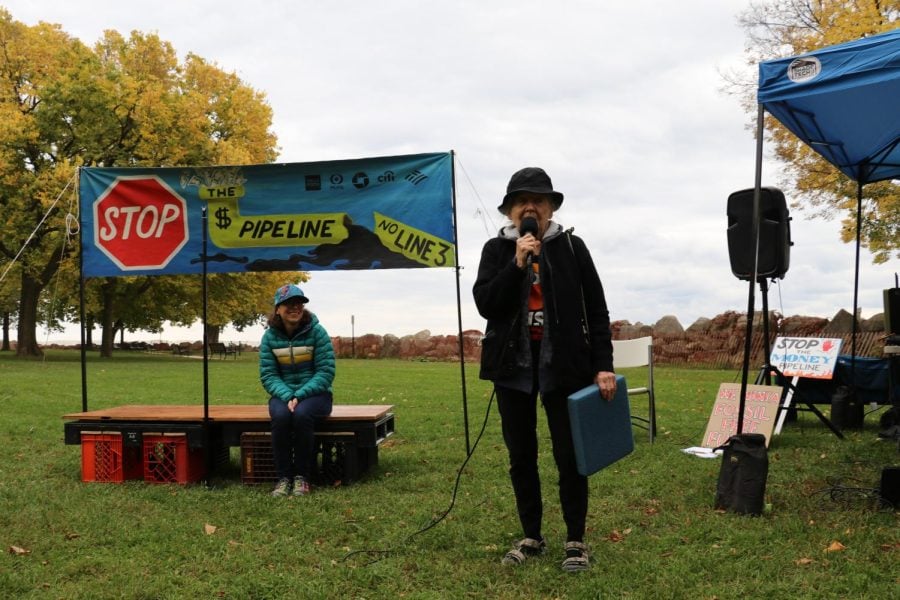Evanston and Chicago climate advocates rally to stop pipelines in Great Lakes
Henry Roach/The Daily Northwestern
An Evanston resident speaks about nuclear energy during the open mic portion of Sunday’s rally.
October 16, 2022
At a Sunday climate justice rally, Evanston and Chicago residents sang together, joining in a call-and-response song with local folk singer Margaret Nelson to ask: “What are you gonna do?”
The “Protect our planet, one pipeline at a time” rally, organized by Chicago Against Line 3, educated attendees about the need to stop pipeline construction and expansion through the Great Lakes region. Many pipelines carrying oil run beneath major waterways, creating risks of water pollution if a leak occurs.
More than 50 attendees gathered in Elliot Park to hear from Evanston- and Chicago-based climate activists, enjoy live music from Creative Artists and Activists in Service Together and connect with other community members.
While the event fundraised for legal defense funds that support climate activists arrested or prosecuted for protests, event emcee Jessy Bradish said a lighthearted atmosphere was also an important part of the rally.
“We wanted to give everyone a reason to get together and have a good time,” Bradish said. “Not every event can be a protest … you need to have a community to stick together. Not everybody can always be on.”
Enbridge, a multinational oil distribution company, runs two pipelines — Line 3 and Line 5 — through the region and under the Straits of Mackinac. Lines 3 and 5 carry oil from Alberta, Canada to Wisconsin and Quebec, respectively.
As these pipelines deteriorate and threaten Indigenous populations in the region, speakers at Sunday’s event said pushing for the shutdown of these lines and preventing future oil spills is crucial.
“Ninety percent of the oil (from Line 5) goes from Canada to Canada, the majority of the jobs are for Canadians, and we are just here to … suffer the consequences of a disastrous oil spill,” said Tessine Murji, a conservation organizer with the Illinois Sierra Club.
In November 2020, Michigan Gov. Gretchen Whitmer ordered the gradual shutdown of Line 5 after years of advocacy from climate organizers and Indigenous groups. However, Murji said Enbridge still has not complied with the order.
Speakers and protesters called for the Biden administration to enforce the Line 5 shutdown order, which Murji said could boost the international drive to transition away from fossil fuels.
Speakers also said oil pollution from Lines 3 and 5 could impact the Anishinaabe peoples who still inhabit the region.
Murji said Line 5 is in direct violation of the 1836 Treaty of Washington, which guarantees access for the Anishinaabe peoples to the natural resources of the Great Lakes area in exchange for a land cession from the Indigenous tribes to the United States.
Charles Johnson, the organizing director of Chicago Area Peace Action, said the environmental justice issues surrounding pipelines are often racially and economically intertwined.
“People who are already being crushed by our system are the ones that get the most impacts of these pipelines,” Johnson said.
To combat these impacts, speakers from Extinction Rebellion emphasized nonviolent direct action. The global organization focuses on organizing acts of civil disobedience as a form of climate activism.
XR’s Chicago group co-sponsored Sunday’s event. At its table beside the stage, it displayed several soup cans next to their informational flyers. Barry Feldman, an XR representative, said the cans referenced a Friday protest by British climate activists who threw tomato soup on Van Gogh’s Sunflowers in the London National Gallery.
“Nonviolent direct action may be the only solution, because corporations and the government are pretty much focused on controlling every project,” Feldman said. “This is one project, the Line 5 oil tunnel, that would not be built in a rational world.”
Locally-focused climate advocates from 350 Chicago, Citizens’ Greener Evanston, and ETown Sunrise also spoke at Sunday’s event.
According to Chuck Wasserburg of Citizens’ Greener Evanston, the citywide environmental advocacy group plans to change their name to Climate Action Evanston over the next few months. Urging city government to focus on actually implementing its Climate Action and Resilience Plan is a top priority, he said.
“The city isn’t really putting a lot of funding toward (CARP),” Wasserburg said. “They get a lot of great attention for it, and that’s wonderful, but they have to make it happen.”
As the rally drew to a close, three Evanston Township High School students and members of youth climate justice group ETown Sunrise took the stage.
With ETown Sunrise now pushing for Evanston/Skokie School District 65 to implement a comprehensive sustainability plan, Jexa Edinberg said uniting local youth movements with these regional climate initiatives is key.
“(Stopping Line 3) feels like a very difficult thing to do,” they said. “But if a bunch of organizations are coming together, and we can join them, then we can create more change together.”
Email: [email protected]
Twitter: @lilylcarey
Related Stories:
— Youth climate activists travel to downtown Chicago to protect fossil fuel legislation
— ‘Generations of Environmental Justice’ provides all-night climate education and builds community
— ETHS students walk out to call for sustainability coordinator, intergenerational advocacy


